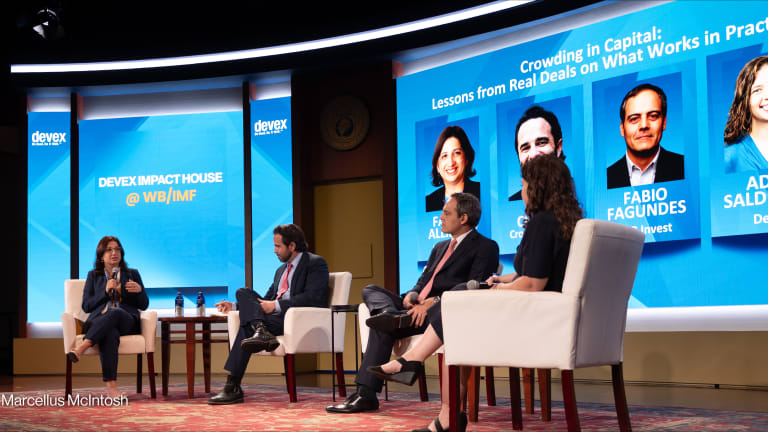
As the Ivory Coast continues to emerge from a decade of civil war, the country’s instability has made attracting private investment quite difficult.
That’s why the insurance provided by the Multilateral Investment Guarantee Agency was essential to bringing investment to several large public-private partnerships for critical infrastructure. The World Bank’s arm to promote foreign direct investment in least-served countries provided insurance to investors for the refurbishment of a power plant, a natural gas development, and a road bridge in that have helped put the conflict-ridden West African nation back on the road to double-digit economic growth.
The Ivorian example may point the way to how the World Bank will use its array of financial tools to leverage its resources to bring private capital flows to the world’s poorest countries.
As the Washington, D.C.-based institution shifts its focus under its new strategy to “transformational projects” that can deliver broad development impacts aimed at eliminating extreme poverty, especially in fragile states, MIGA has played an increasingly important role, also in line with President Jim Kim’s ambitious reform agenda for the World Bank.
“We have a president who has been very vocal about conveying outside and also internally, that there is more in the World Bank than three organizations working separately, and that is translating to the country level,” Michel Wormser, MIGA’s vice president and chief operating officer, told Devex.
MIGA, he explained, has embraced this new role by using its resources to support a riskier portfolio, to develop a range of innovative credit enhancement tools designed to create the confidence and stability that investors require to go into a new frontier of emerging markets, and to grow the organization itself to meet growing demand for its products.
The volume of the agency’s portfolio has doubled over the past five years and is still growing by ten percent per year.
MIGA has already expanded its business to provide credit guarantees for investments at the country and municipal level, which has broadened its impact in middle-income countries like Turkey and Brazil. It announced last year that it would also begin providing credit guarantees at to state-owned-enterprises, and it will be making several of those guarantees over the coming months, said Wormser.
Fragile states key to eradicating poverty
Infrastructure investments are seen as critical to growth in middle-income countries as well as poorer ones, and the longer terms and lower rates offered because of the MIGA guarantees make them more feasible.
But it’s in countries like the Ivory Coast — where many of the challenges for the bank lie in the years and decades ahead — that the ability of the institution to brings resources and private capital flows to poor and fragile states is seen as critical to the bank’s ability to achieve its goal of eliminating extreme poverty around the world.
READ:IFC sees opportunity for pension funds to invest in fragile states
The International Finance Corp., the World Bank’s private sector lending arm, has pledged to increase its funding for projects in fragile states from about 4 percent percent of its portfolio to 50 percent, and it is is increasingly cooperating with MIGA to bring that financing to frontier markets.
For instance, in the Ivory Coast, the IFC provided financing for the Azito power plant in cooperation with MIGA, which insured private investment in the project.
“This sort of cooperation across the group was almost absent five to ten years ago. And now it’s becoming much more common, with many more country directors interested in drawing on MIGA and more aware of what MIGA can do to support the country,” said Wormser.
Country demand is focused on infrastructure investments and investments that create jobs, and perhaps unsurprisingly, he sees MIGA as critical in both of those areas.
Wormser recently returned from the Ivory Coast, where over 2,000 investors were gathered to learn about opportunities in the country — a sign, he says, of the transformative effect of MIGA’s involvement.
Read more development aid news online, and subscribe to The Development Newswire to receive top international development headlines from the world’s leading donors, news sources and opinion leaders — emailed to you FREE every business day.
See more:








